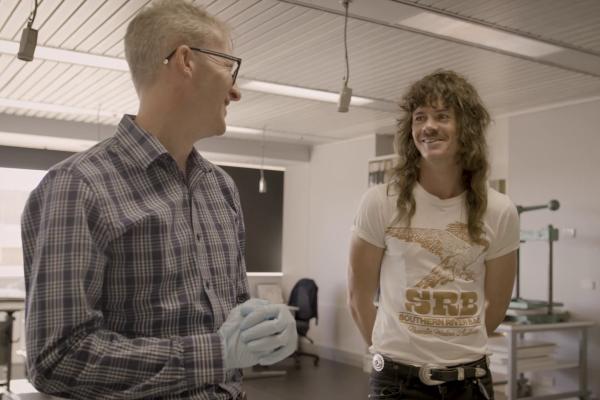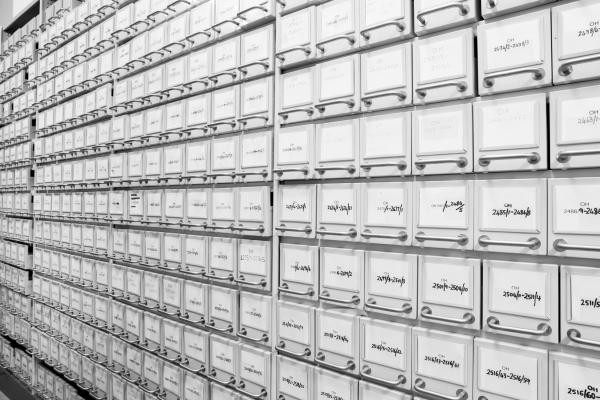One of Western Australia's favourite sons, Bon Scott, is well-loved as the original frontman of the rock band AC/DC and is known for his raw, honest lyrics. But did you know that Bon was also a prolific letter writer? Since 2019, the State Library of Western Australia has acquired five of Bon's letters. Two letters to his friend Colin Moore were recently added to the Library's collection alongside some of the last photos to be taken of Bon in Australia before his death.
The State Library's Adam Trainer joined Sam Longley on ABC Radio Perth to discuss Bon's legacy as a performer and discover another side to Bon revealed in his personal correspondence.
Recorded live on ABC Radio Perth on 12 May 2023.
The State Library invited local musician Cal Kramer from The Southern River Band into our Conservation Lab to be the first member of the public to read these incredible postcards from 1979. Watch the video below.
Transcript
Beginning of Interview
Sam Longley (SL): Does the art of letter writing live on in your notepad or pen? Hmmm? The craft was…now it’s faded away as emails and text message communications become readily available and easy. But there’s something to be said about opening a handwritten letter or card and seeing that unique style, sometimes even hard to read script.
Someone that you might not have thought to be much of a letter writer was legendary AC/DC singer Bon Scott but it turns out he was, and the State Library has shown interest in collecting some of his letters because wouldn’t you? I would. They bought them up in auctions and the first one that they purchased was for $14,000 and it wasn’t because of a fancy stamp. It was because it was written by Bon Scott. So what do these letters say and why are they so important to the history of WA.
Adam Trainer is from the State Library of WA and can tell me more.
SL: Hi Adam.
Adam Trainer (AT): Hi, how’s it going Sam?
SL: Yeah, good mate. Glad to have you here on the long lunch. First question and I have to ask it. Are you a letter writer?
AT: I was thinking about this actually and as you suggested - cards, and birthday cards or greeting cards etc. I think that’s probably the extent of my letter writing prowess. I was trying to think when was the last time I received an actual hand written letter from a personal correspondence as opposed to just something that you get in the mail and I feel like it was maybe almost twenty years ago from a friend at the time who was living in Melbourne and moved back shortly thereafter and even you know after that, we got together and she became my wife, and twenty years later a couple of kids. So I don’t know, I think there is something romantic about letters, you know what I mean?
SL: Well obviously it worked for you, didn’t it?
AT: I guess that’s what I was getting at.
SL: Yes absolutely. It must be pretty cool to be able to see what’s going on, just in the mind of somebody else. Like for example, having Bon Scott’s inner thoughts on paper, that’s got to be fun to be able to read those.
AT: Absolutely, and I mean look, Bon was a prolific letter writer as you indicated in your intro…um a prolific writer because obviously he was writing all of those song lyrics as well and look something of I guess, a street poet…if you want to put it that way. Taking the sort of everyday experiences of Aussie battlers or people who were sort of maybe living on the edge a little bit. He had that reputation. But then he was also a fiercely loyal friend and he loved his friends and he loved to communicate with them, and when he was on the road, he would write them letters and you see that Bon Scott come through in his written correspondence as opposed to the guy that’s sort of writing about all of the hard living in the AC/DC songs.
SL: Yeah, I mean the songs, often the lyrics, well anytime you write a song, it’s curated words. You know, you’re really putting down and you’re trying to fit it to music. You must be shaping it and polishing it until you get to finally record it; whereas a letter, though you can do that, it must be more stream of consciousness. It must be a little bit more of a peek inside to see what the man’s like. What do we learn from those letters?
AT: Yeah, well… we learnt some really interesting insights about how Bon feels about what the band is going through. So we have five letters in total that range from 1975 to 1979. Now the last of those are considered to be just a few months before he sadly passed away and just before he sort of left Australia, before he met his untimely death in the UK some months later. So sometimes he’s here, sometimes he’s on tour. He talks a lot about the gruelling tour schedule. He talks about doing some recording sessions while you’re on the road. He writes about some of the money troubles that…I mean you might think that a band that are hitting their stride, selling lots of records, doing really well, playing to huge audiences. Financially the band may well have been doing well but most likely they were probably still on per diems… and Bon did have some money troubles. He would often drink his money away and yeah, so you really learn about how the pressures of the road, the pressures of being in…it sounds like a lot of fun to lots of people to be in a very successful rock band, but it is a bit of a pressure cooker situation and you definitely get the sense that he was experiencing that during that time.
SL: Can I ask then, I mean ‘cos it does seem like a massive insight. We’ve got his back catalogue of music and that’s fantastic. And AC/DC wasn’t his first band, was it?
AT: No, Bon started playing in bands in Perth in the mid-1960s - he was in a band called The Spektors where he drummed and sang and then that band sort of merged with another one and became The Valentines. Now The Valentines did reasonably well they had a couple of songs. They recorded a lot with Clarion Records which was the West Australian recording studio at the time run by Martin Clarke; had some hits, got their music promoted across the country and from there they sort of headed over east. They won, actually both The Spektors and The Valentines won the Hoadley’s Battle of the Bands which was the big national band competition at the time. They won the Perth versions of that, so that sort of led to heading over East and gaining a little bit of traction, and I think Bon probably realised at that time, as was the case for a lot of West Australian musicians, if you wanted a sustainable career, you’ve got to leave Perth. That’s what happened so he found himself in Sydney, formed a progressive rock band called, or joined rather a progressive rock band, called Fraternity and then just a few years later, it didn’t last very long, and then a few years later he found himself…yeah… asked to join a nascent rock band at the time who became AC/DC.
SL: Right
AT: So he actually had a relationship with George Young who was the songwriter from the Vanda & Young songwriting team of the Easybeats. Now George’s two younger brothers, Angus and Malcolm, were in AC/DC and so that was where that connection came in.
SL: So now it’s public knowledge that the library purchased one of the letters for $14,000.
AT: The first one, that’s right.
SL: Yeah, the first one. $14,000 seems like an awful lot of money to pay for a letter, but what is the importance of that piece of history to WA?
AT: Yeah, well you’ve got to look at what is the significance of the person who wrote it and I think really you talk about Bon Scott, most West Australians probably know him. They know that he really connects this place to the rest of the world through his work in AC/DC, and that’s what we look at when we’re thinking about what to collect and whether it’s worth collecting something. You know, did this person have an impact? Were they significant locally, nationally, internationally? And what does it actually mean for us to acquire this thing and I think you can see in those letters when you read them, the things that he’s talking about and the journey that this West Australian has gone on to expand his career and to grow and to take his music around the world.
SL: Yeah, look I think it’s fantastic that we have those letters. I think we need to hold on to our little bits of history and really delve into them. Do we know how many letters are out there? Like how prolific he was? Or is that just speculation and hearsay?
AT: Well I certainly couldn’t give you any concrete indication of how many are out there. Look, we have five letters as I’ve said. They were written to - one was written to a friend of his, Valerie, who was in Perth while he was abroad. Another was written to a friend, Mary Walton, who was in the UK while he was in Sydney. And the third, a friend Colin Moore who was his motorcycle buddy. So they’re a couple each, so if each of those people have a couple, I’d say there are maybe a dozen or a couple of dozen perhaps of Bon’s close friends and maybe they’ve got a few each but who knows, that really is, you know, just wild speculation.
SL: OK, so this is something I’ve always wondered because I think of history a little bit like treasure hunting and that you’re, I mean, a little bit Indiana Jones because there is the possibility of so much out there and with something like Bon Scott, it’s beautiful and exciting and interesting. How do you authenticate these letters and just to let everybody know, we are talking to Adam Trainer from the State Library about Bon Scott’s letters, and I want to know what is the process when it comes to authenticating these?
AT: Well, so the first one was purchased at auction and if you’re going to sell anything at auction, then it has to be obviously authenticated and so there’s…a valuer will come in and actually look at it, so in the case of personal correspondence they’ll look at the handwriting. They’ll look at other examples that they have that’ve already been verified and authenticated. With Bon Scott they might even perhaps look at, if they can get a hold of them, because they know thst they were definitely written by Bon, some of the AC/DC song lyrics for example match the handwriting…of course you’ve got the signature at the end. What’s really interesting about some of these is that the letters themselves are written in one pen and then he signs his name in a slightly different coloured pen. He probably had an autograph pen where he signed his name with that particular pen. Or maybe it was just that he sort of, he finished it later and came back with a different pen. Nonetheless they’ve all gone through this process, been authenticated, and the other thing is several of these were received from the person who actually received the letter. So for example, Colin Moore actually - we received the letters that he got back you know 40 odd years ago. They came directly from him and he had a known relationship with Bon. They were close friends. He ran a motorcycle shop in Sydney and Bon was a big fan of motorbikes and would always be in his shop.
SL: So are they just mates or was this, hey by the way, can you please save a motorbike for me? I am looking for a spare part for the…or was it…I am on the road, it’s been really hard. Or is between those five letters is there a little bit of transactional, a little bit of personality?
AT: Yeah, there’s a little bit of all of that. So for example with Colin, he’s sort of saying things like “Hey, if you get anything great, come into the shop. Keep it in mind for me. I had a ride of you know, I think it was a Harley Low Rider or something like that the other day and I immediately fell in love with it.” Bon, it being Bon, uses slightly more colourful language to describe things like that. There’s even a little bit of “Hey whatever happened to that little blonde across the street? You know, she never did write back to me…so say gidday to her if you see her.” That kind of thing.
When he’s writing to Valerie who I believe he was in a relationship with at some point - there certainly is a tenderness and there’s also a real sense of missing her, missing his family. He talks about really missing Fremantle and Perth and wanting to get back and see his family, being on the road…and looking forward to actually being with the people that he loves and that’s why he’s writing the letters in the first place.
SL: That’s fantastic. If you do have a letter, if you’re a letter writer, let me know. Text us in, let us know. I’d love to know if you are one of those letter writers. Bon Scott was, which blows my mind because people don’t think of him that way, do they? They think of him more grungy and rock and roll. I’m wondering if other people have other letters and if they do, how do they get them to you…if they want to.
AT: Ah, well, yeah we were actually approached after we purchased this first one by auction, and as you mention there was a little bit of press actually about the amount that we have paid for it. People were just understandably asking is that a fair price…or should tax dollars be spent on this kind of thing? Look you know we have an acquisitions budget and we need to balance all of those factors when we think about what is it that we are actually acquiring so after we purchased the first one, it essentially became known publicly that we were interested in this kind of thing and we were actually contacted by successive vendors after that, who sort of said “I see that you purchased this. I’ve got a Bon Scott letter. Are you interested in it?” And then we would negotiate from there. So look, if some famous West Australian has written to you and you would like some safekeeping for that letter, then the State Library is certainly happy to discuss that with you.
One of the things that I guess is important to remember is to why we acquire these things is that for example, the most recent ones that came from this guy Colin Moore, he actually said, he’s getting on in years and he’s thinking well wouldn’t it be great for the public to enjoy these. And as a state collecting institution, everything that comes into our collections. It belongs to the state. It belongs to the people of Western Australia. They can access it and appreciate it and it’s there for safekeeping. We will keep it forever. And we can keep it in very good condition and keep it very very safely so that everyone can enjoy these things.
SL: Adam Trainor, rock and roll treasure hunter for the State Library of WA is how I will think of you forever more, and Adam Trainor thank you so much for your time.
AT: Thanks for having me, Sam.
SL: It’s an absolute joy. Hey let us know, do you still write letters? Or have you kept some? Maybe there’s a correspondence from a famous West Australian. Let me know, give us a text 0437 922 720 or give us a call.
End of Interview
You may also be interested in...


